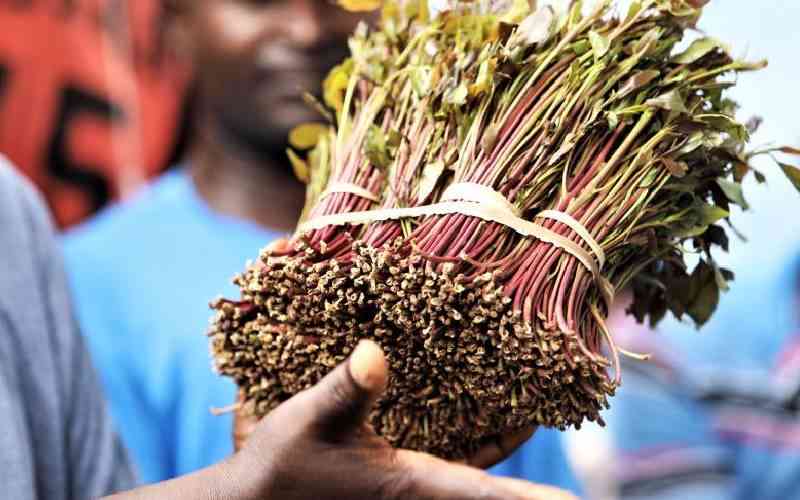
Miraa farmers in Meru county have expressed mixed reactions to the publication of the Crops (Miraa) Regulations 2023, implementing the Miraa Levy.
The regulations are expected to regulate the production and trade of the lucrative stimulant crops, while at the same time ensuring the production of quality miraa for local and export markets.
Agriculture and Food Authority (AFA) delayed the implementation of the Miraa Levy as it took time to build a framework for it.
But now after completing the e-platform on AFA’s Integrated Management Information System, the the AFA through Acting Director General Willis Audi, issued a notice that the Miraa Levy would take effect as from yesterday.
It is an announcement that has been greeted with mixed sentiments by various stakeholders, including farmers, traders and consumers.
While consumers fear the cost of miraa might go up, some of the traders and leaders from miraa growing zones have welcomed the introduction of the levy, arguing that it will boost the sub sector.
Nyambene Miraa Farmers and Traders Association (Nyamita) and Igembe Central MP Dan Kiili are among those who have welcomed the announcement, which they said was proof that the national government was prioritising developing the miraa sub sector.
Mr Kiili was quick to assure other players along the value chain that the levy was good and it was only affecting exported miraa.
“Let us pay so that the State can recognise us as partners. In any case we are paying only Sh3 per kilo and it is only on export products," said Kiili.
Nyamita Chairman Kimathi Munjuri said miraa players were now glad that the journey they started since 2018 of ensuring the government was treating miraa just like other cash crops, was bearing fruit.
“This marks a step in the entrenchment of miraa into government fabric and makes miraa industry a legit key stakeholder of government. The levy collected can now be used in efforts to ensure we have sustainable markets and reliable miraa farming and handling backed by authoritative science,” Munjuri stated.
About the effect of the levy on miraa cargo, Munjuri said even if it is being charged on miraa crop exports at Sh7 per kilo, they were satisfied because it was now recognised as other scheduled crops.
Munjuri said they did not want the miraa fraternity to be treated specially by the government, the reason they did not mind to chip into bills for activities meant to improve the miraa crop.
He said the levy will enable the Miraa Directorate domiciled in the Ministry of Agriculture to look for markets, and introduce best farming practices informed by scientifically tested and proven methods.
“Miraa is a scheduled crop and that status attracts a levy to fund the activities of the Directorate to promote the crop,” Munjuri said.
He was reacting to fears of some of the farmers and consumers that the levy could discourage production and marketing.
“Because every time a tax is introduced it is inevitable that the cost of the product goes up. As much as our miraa leaders are trying to assure us it will not have a bad effect on farmers, consumers and transporters, we are taking it with a pinch of salt,” said Vincent Mauta, a miraa vendor.
Nyamita opposed pricing of miraa being left to any body, urging to “let Miraa prices be left to market forces of supply and demand.”